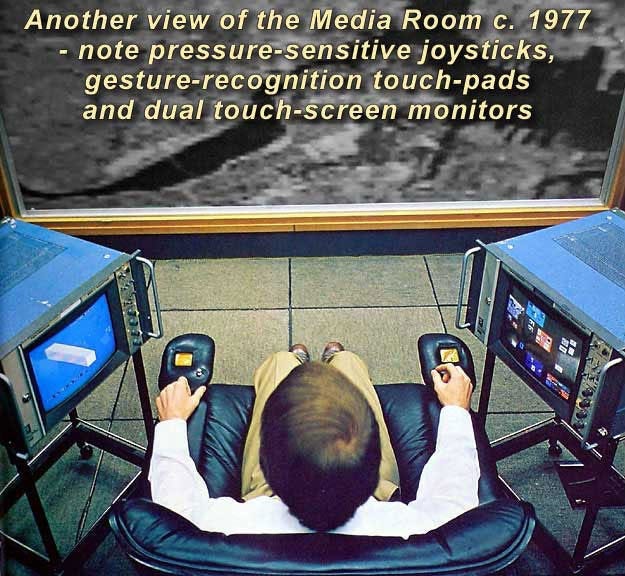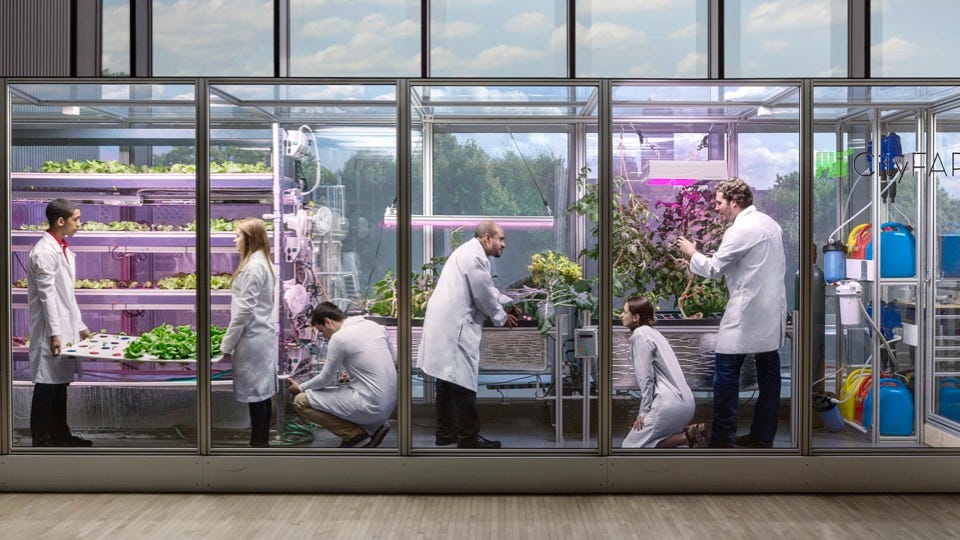It’s about quality of life in an electronic age. It’s a primer for a new life-style. …The right to stay in your pajamas.
— Nicholas Negroponte
I like trying to find truths around the question of “why are we all here?”
And something I find interesting is the broad sense of “we don’t know where anything is going”-isms that I feel has tech people in a chokehold. The result of this is a lot of wandering about the desert, abandoning technology totally, an angst and lack of dedication to the work itself. In short the gripping fear of what if there was no there, there.
I’m here to tell you that not only is there a there, there. But we are in the beginning of change for the better, if we care enough to fight for it.
We all made our way to computers and the internet for many reasons. But I believe we all chose to work for this digital environment for a singular reason.
The belief that it could be even better.
We are all here to improve what Nicholas Negroponte, co-founder and chairman Emeritus of MIT’s Media Lab (which he directed for its first 15 years), would call “DIGITAL QUALITY OF LIFE”.
We all have an understanding of what drives the general definitions of quality of life globally. Measures of wealth/poverty, infant mortality, education, life-span, nutrition, the list goes on.
But how might we think about DIGITAL QUALITY OF LIFE, and how we might collectively improve it? How is it changing already? How did believe it was changing in the past? What lessons might we draw for tomorrow’s digital ecology?
SOME CATEGORIES FOR DIGITAL QUALITY OF LIFE:
Connectivity and Access
Digital Literacy and Skills
Online Safety and Security (both personal and infrastructure/systems)
Creativity, Expression, Growth, and Learning
Civic Participation
“E-Health” (reducing online gambling and porn addiction)
Digital Work-life Balance (when work is online, the workplace is never off)
Diversity of Applications and Utility
Material Connection and Coordination (Uber is a classic example)
Privacy, Authentication, and Autonomy
Accessibility
Negroponte’s vision: all communication technologies are suffering a joint metamorphosis, which can only be understood properly if treated as a single subject, and only advanced properly if treated as a single craft. The way to figure out what needs to be done is through exploring the human sensory and cognitive system and the ways that humans most naturally interact. Join this and you grasp the future.
- Stewart Brand
I believe we culturally need about 3 more MIT Media Lab like institutions today. A clear call around special projects that serve as inspiration points/research towards improving our digital quality of life, recognizing the hold on our time is too central to humanity’s core operations and thus isn’t going anywhere, and that these institutions should be decently freed from the burdens of profit seeking.
That last point is a rare one from me. In generally agreeing that much of our technological progress has been related to a breaking away from higher education institution, and providing the time pressure box of private capital. However, I believe AI shows how much the progress of the last few years have benefitted from a very long term view of it’s value… specifically within the research halls of places like Google where Ilya Sutskever spent a lot of his research time before going to co-found Open AI. Another institution where, although noticeably rocky recently, took an approach to innovation that was freed from the demands of a traditional profit maximizing structure.
Maybe there’s something there.
Things that come close to this in my mind are spaces like New Lab here in NYC, South Park Commons (SF), Recurse Center (NYC). I’d love to learn about more or folks that have been thinking about what a new MIT Media Lab would look like, even at other universities.
BUT BACK TO DIGITAL QUALITY OF LIFE & OUR WORK
Some of us enjoy a privileged existence where our work life and our leisure life are almost synonymous. More and more people I think can move into that position with the coming of truly intimate technology, a fully integrated electronic presence for everybody.
- Nicholas Negroponte
I find much of my frustration around the lack of critique culture, is an unwillingness to assess whether or not we are actually trying to improve the nature of our digital ecology. When we can no longer assess the the quality of our intentions, what sits on the other side of that is the purest state of entropy.
The immediate counter to what I’m saying is on the nature of the attempt. “Reggie, many things obviously start out with the goal of improving X, but shift or become more neutral due to market conditions or yada yada yada”
That is a generous interpretation. One can take an extremely quick glance across crypto, consumer internet, and DTC brands — scroll back to their initial statements for existing, and find an decrepit state of affairs.
What can account for this? Is it as sacred as the extending loss of the entrepreneur’s mandate of heaven? Possibly. But I don’t think it’s that romantic. The mandate is still there for those that can tap into it.
Instead, this is far more sinister insofar that it is is far more mundane.
I remember popping down to Miami when everyone and their mother was fleeing SF. And the number 1 thing that stood out was that no one was talking about technology, ideas, or hardly even Miami itself — they were talking about money. A lot of money.
The state of VC-backed-entrepreneurship can be summed up as much. It’s a discussion all about money. Which is why fundraising rounds and the collapse of companies get’s so much press.
It’s not about what is lost or gained as a function of the mission or product existing. It is about money, influence, and the people (founders/vc’s) that are able to wield it. The actual wrapper that is the ingestion engine of the capital itself is secondary, and they (the media) will come back to the wrapper if it ever does something wrong in their eyes.
But I would propose this:
THE NEW TECHNOLOGIST is concerned about capital, only in the sense that it is a tool that furthers the production of technology — where THAT goal is towards an improvement in our DIGITAL QUALITY OF LIFE.
The Media Lab is committed to making the individual the driver of new information technology rather than the driven. It does so by focusing on “idiosyncratic systems” that adapt to the user, by encouraging computation in real time and communication out of real time. Computation in real time means the human can interact live, “converse” with the machine, oblige it to function in human terms. Thus the push at the Lab for real-time computer animation, holography, and speech interpretation.
— Stewart Brand
WE ARE SHOOTING FOR ETERNAL RENAISSANCE
We have already seen the arrival of personal computers make multitudes broader in their skills and interests, less passive, less traditionally role-bound. That’s renaissance.
— Stewart Brand
What happens when we get this right? What sits on the other side of some of these values / probes — such as a rejection of capital forward narratives and the categories of digital quality of life listed previously?
Renaissance by definition is rooted in revival / renewal. Something was lost, and through some concoction of happenings, that something has been found again.
Eternal Renaissance is my personal version of accelerationism. We should not need to ever lose the Bible from within the church… what does that say about us?
I believe we can string together wins. That with a series of daring images, and coordination, we can set the rails for infinite progress. That doesn’t mean we won’t have to go around tight corners at a slower pace.
But what it does mean is that a grounding in the improvement of digital quality of life, has the structural basis for what is meant to come next. Again, only if we care to set on a more critical course than the whims of ego and capital for personal gain.
What needs to be articulated, regardless of the format of the man-machine relationship, is the goal of humanism through machines.
— Nicholas Negroponte
While technology certainly massages us over in the McLuhan sense, it provides the basis to see one’s self as absolutely human (at least today).
The real otherness of AI is something to be embraced. It serves as an omnipresent comparative reminder of the differences across intelligence. I’ve become more grateful and reliant on mine.
What my own intelligence has reminded me, is the fundamental nature of this human (American?) project.
That the individual can hold a set of values so thoroughly. And can set the environment (from those values) for coordination with others. To produce artifacts of innovation meant for the bettering of their peers experience. And in doing that, of course, yes capital will be a sort of necessary byproduct.
In believing this, we are set with a few tasks:
How do I get my peers to see this shift as well?
What institutions are missing in order to further promote these ideals while also producing technology that stands as a prime image of living these ideals?
And finally, what do I see that needs improving for our digital quality of life → and how might we set on the course of experimenting towards that improvement?
Take a moment to remind yourself why you are working here. Odds are you could have taken a job at Goldman or McKinsey, but you didn’t. There was a reason for that… all those years ago. Let yourself come back to that reason. Progress is a spiral like that.
I was working on a different essay than this for issue 101, but it’s been taking longer than expected. It’s about Identity, Memory, and Transformation. I’m really excited about it, and I can’t wait to finish it.
I don’t do edits really, so excuse typos and things that don’t make sense.
Thanks so much for giving me your attention. I hope it was worth it, if not… unsubscribing will not hurt my feelings, and will give you back time you literally cannot have back.
Much love.
Live in the light







